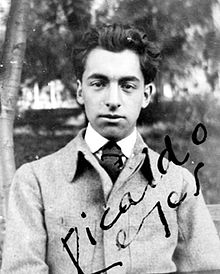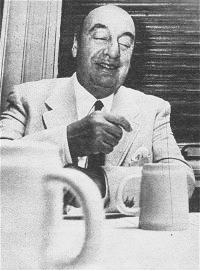Pablo Neruda
Pablo Neruda (/nəˈruːdə/ nə-ROO-də;[1] Spanish pronunciation: [ˈpaβlo neˈɾuða] ⓘ; born Ricardo Eliécer Neftalí Reyes Basoalto; 12 July 1904 – 23 September 1973) was a Chilean poet-diplomat and politician who won the 1971 Nobel Prize in Literature.
Ricardo Eliécer Neftalí Reyes Basoalto was born on 12 July 1904, in Parral, Chile,[9] a city in Linares Province, now part of the greater Maule Region, some 350 km south of Santiago.
[10] His father, José del Carmen Reyes Morales, was a railway employee, and his mother Rosa Neftalí Basoalto Opazo was a school teacher who died on 14 September two months after he was born.
Neruda's father opposed his son's interest in writing and literature, but he received encouragement from others, including the future Nobel Prize winner Gabriela Mistral, who headed the local school.
On 18 July 1917, at the age of 13, he published his first work, an essay titled "Entusiasmo y perseverancia" ("Enthusiasm and Perseverance") in the local daily newspaper La Mañana, and signed it Neftalí Reyes.
[15] In 1926, Neruda published the collection tentativa del hombre infinito (venture of the infinite man) and the novel El habitante y su esperanza (The Inhabitant and His Hope).
[26] While he was in the diplomatic service, Neruda read large amounts of verse, experimented with many different poetic forms, and wrote the first two volumes of Residencia en la Tierra, which include many surrealist poems.
As a political activist, his stance as a communist comes out in his poem as he calls the wealthy corporations “bloodthirsty flies” and resembles a “dictatorship.” He compares United Fruit Inc. to big-name companies such as Coca-Cola and Ford Motors to emphasize their strength and power over the little countries residing in Latin America.
[27] He later succeeded Gabriela Mistral as consul in Madrid, where he became the center of a lively literary circle, befriending such writers as Rafael Alberti, Federico García Lorca, and the Peruvian poet César Vallejo.
[28] She died in 1943 at the age of eight, having spent most of her short life with a foster family in the Netherlands after Neruda ignored and abandoned her, forcing her mother to work solely to support her care.
The radical leftist politics of his literary friends, as well as that of del Carril, were contributing factors, but the most important catalyst was the execution of García Lorca by forces loyal to the dictator Francisco Franco.
Martín Espada, a poet and professor of creative writing at the University of Massachusetts Amherst, has hailed the work as a masterpiece, declaring that "there is no greater political poem".
"[44] On 15 July 1945, at Pacaembu Stadium in São Paulo, Brazil, Neruda read to 100,000 people in honor of the Communist revolutionary leader Luís Carlos Prestes.
Anxious not to provide ammunition to his ideological enemies, he would later refuse publicly to condemn the Soviet repression of dissident writers like Boris Pasternak and Joseph Brodsky, an attitude with which even some of his staunchest admirers disagreed.
Neruda's criticism of González Videla culminated in a dramatic speech in the Chilean senate on 6 January 1948, which became known as "Yo acuso" ("I accuse"), during which he read out the names of the miners and their families who were imprisoned at the concentration camp.
Prior to this, he shared his sentiments: "In this painful and victorious hour that the peoples of the Americas are living, my poem, with changes in location, can be understood as directed towards Fidel Castro, because in the struggles for freedom, the destiny of a man always emerges to instill confidence in the spirit of greatness in the history of our nations.
[54] Pablo Picasso arranged his entrance into Paris, and Neruda made a surprise appearance there to a stunned World Congress of Peace Forces[clarification needed], while the Chilean government denied that the poet could have escaped the country.
Matilde Urrutia was the muse for Los versos del capitán, a book of poetry that Neruda later published anonymously in 1952. from "Full Woman, Fleshly Apple, Hot Moon"
The Chilean Socialist Party was in the process of nominating Salvador Allende as its candidate for the September 1952 presidential elections and was keen to have the presence of Neruda, by now Chile's most prominent left-wing literary figure, to support the campaign.
The Congress for Cultural Freedom, an anti-communist organization covertly established and funded by the U.S. Central Intelligence Agency, adopted Neruda as one of its primary targets and launched a campaign to undermine his reputation, reviving the old claim that he had been an accomplice in the attack on Leon Trotsky in Mexico City in 1940.
[61] Officially, he was barred from entering the U.S. because he was a communist, but the conference organizer, playwright Arthur Miller, eventually prevailed upon the Johnson Administration to grant Neruda a visa.
[61] Upon Neruda's return to Chile, he stopped in Peru, where he gave readings to enthusiastic crowds in Lima and Arequipa and was received by President Fernando Belaúnde Terry.
Shortly thereafter, during a search of the house and grounds at Isla Negra by Chilean armed forces at which Neruda was reportedly present, the poet famously remarked: "Look around – there's only one thing of danger for you here – poetry.
"[5] On 12 May 2011, the Mexican magazine Proceso published an interview with his former driver Manuel Araya Osorio in which he states that he was present when Neruda called his wife and warned that he believed Pinochet had ordered a doctor to kill him, and that he had just been given an injection in his stomach.
The 1971 Nobel laureate was scheduled to fly to Mexico where he may have been planning to lead a government in exile that would denounce General Augusto Pinochet, who led the coup against Allende on September 11, according to his friends, researchers, and other political observers".
[72] In June 2013, a Chilean judge ordered an investigation to be launched following suggestions that Neruda had been killed by the Pinochet regime due to his pro-Allende stance and political views.
Police were investigating Michael Townley, who was facing trial for the killings of General Carlos Prats (Buenos Aires, 1974) and ex-Chancellor Orlando Letelier (Washington, 1976).
Patricio Bustos, the head of Chile's medical legal service, stated, "No relevant chemical substances have been found that could be linked to Mr. Neruda's death" at the time.
[90] Several feminist groups, bolstered by a growing #MeToo and anti-femicide movement, stated that Neruda should not be honored by his country, describing the passage as evidence of rape.
The Italian film Il Postino (1994) is a fictional work about a humble man who is hired to deliver mail by bicycle to just one recipient of the island Procida, Neruda, living there in exile.







